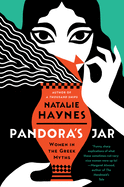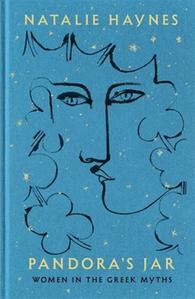
 Classicist Natalie Haynes (The Furies; A Thousand Ships) brings her prodigious expertise to Pandora's Jar: Women in the Greek Myths, a thorough consideration of the perspectives, reputations and visibility of some of ancient Greece's most famous female characters. The title refers to the first correction Haynes offers: rather than the mythic Pandora's box, Pandora in the original Greek opened a jar, which is only the first of several misconceptions. Not that there will ever be an authoritative version: even Homer, Haynes reminds us, drew on earlier sources. Myths "operate in at least two timelines: the one in which they are ostensibly set, and the one in which any particular version is written," and Haynes has a firm grasp of numerous iterations. In her capable hands, Pandora and others appear as multifaceted, complex characters, even across conflicting accounts. Best of all, despite its impressive depth of research, Pandora's Jar is never dry, and frequently great fun.
Classicist Natalie Haynes (The Furies; A Thousand Ships) brings her prodigious expertise to Pandora's Jar: Women in the Greek Myths, a thorough consideration of the perspectives, reputations and visibility of some of ancient Greece's most famous female characters. The title refers to the first correction Haynes offers: rather than the mythic Pandora's box, Pandora in the original Greek opened a jar, which is only the first of several misconceptions. Not that there will ever be an authoritative version: even Homer, Haynes reminds us, drew on earlier sources. Myths "operate in at least two timelines: the one in which they are ostensibly set, and the one in which any particular version is written," and Haynes has a firm grasp of numerous iterations. In her capable hands, Pandora and others appear as multifaceted, complex characters, even across conflicting accounts. Best of all, despite its impressive depth of research, Pandora's Jar is never dry, and frequently great fun.
After the opening chapter's title character, Haynes introduces readers to Jocasta, Helen, Medusa, the Amazons, Clytemnestra, Eurydice, Phaedra, Medea and finally Penelope. Readers unfamiliar with their stories are guided through the relevant versions. These myths involve traumas of marriage, motherhood, rape and betrayal; their themes are serious and unforgiving. Perhaps surprisingly, some of the misogyny and erasure that Pandora, the Amazons, Eurydice and others have experienced have surprisingly modern origins. "Not for the first time, we see that an accurate translation has been sacrificed in the pursuit of making women less alarming (and less impressive) in English than they were in Greek." Among Haynes's subjects, "some have been painted as villains (Clytemnestra, Medea), some as victims (Eurydice, Penelope), some have been literally monstered (Medusa)," but each contains depths: "Medusa is--and always has been--the monster who would save us."
Haynes's authorial voice is remarkable: expressive, nuanced, impassioned. Her tone is absolutely accessible, even conversational, and often laugh-out-loud hilarious. Haynes (also a stand-up comic) is as well versed in the modern world and its concerns as in the ancients. The book opens with 1981's Clash of the Titans, and refers to Beyonce and Wonder Woman with the same ease and mastery as it does Homer, Ovid, Euripides, Aristotle, Aeschylus and many more ancients and more recent writers. Haynes's assessments of the visual arts (from ancient pottery through Renaissance paintings to modern television and movies) offer another dimension in this meticulous study.
The classics are as relevant, subversive and entertaining as ever in this brilliant piece of work. Clever, moving, expert, Pandora's Jar is a gem, equally for the serious fan or scholar of Greek myth, for the feminist or for the reader simply absorbed by fine storytelling across time and geography. --Julia Kastner, librarian and blogger at pagesofjulia
Shelf Talker: This classicist's reconsideration of famous Greek myths from various female perspectives combines cultural and literary criticism, humor and wit.

